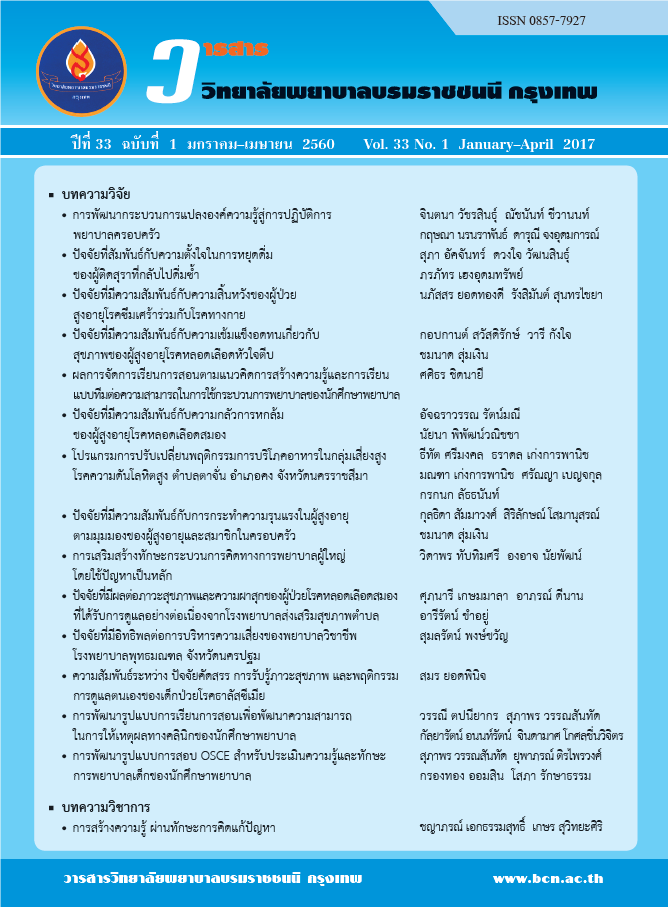ปัจจัยที่สัมพันธ์กับความตั้งใจในการหยุดดื่มของผู้ติดสุราที่กลับไปดื่มซ้ำ FACTORS ASSOCIATED WITH INTENTION TO ALCOHOL ABSTINENCE AMONG PERSONS WITH RELAPSED ALCOHOL DEPENDENCE
คำสำคัญ:
ผู้ติดสุราที่กลับไปดื่มสุราซ้ำ, ความตั้งใจในการหยุดดื่มสุรา, ทัศนคติต่อการดื่มสุรา, การรับรู้ความสามารถ ของตนในการหยุดดื่มสุรา, การจัดการพฤติกรรมการดื่มสุราของผู้ติดสุรา, relapsed alcohol dependence, Intention to alcohol abstinence, attitude towards alcบทคัดย่อ
บทคัดย่อ
การศึกษาครั้งนี้มีวัตถุประสงค์เพื่อศึกษาความตั้งใจในการหยุดดื่มสุราและปัจจัยที่สัมพันธ์กับความตั้งใจในการหยุดดื่มของผู้ติดสุราที่กลับไปดื่มซ้ำทั้งเพศชายและหญิงที่มารับการบำบัดซ้ำครั้งที่ 2 ณ แผนกผู้ป่วยนอก โรงพยาบาลธัญญารักษ์ขอนแก่น ซึ่งได้มาจากการสุ่มตัวอย่างแบบง่ายจำนวน 90 คน เก็บข้อมูลโดยใช้แบบสอบถามข้อมูลส่วนบุคคลแบบสอบถามความตงั้ ใจในการหยุดดื่มสุรา แบบสอบถามทัศนคติต่อการสรุา แบบสอบถามการรับ รู้ความสามารถของตนในการเลิกดื่มสุรา และ แบบประเมินการจัดการพฤติกรรมการดื่มสุรา โดยมีค่าสัมประสิทธิ์แอลฟาของครอนบาค เท่ากับ .91 .70 .98 และ .82 ตามลำดับ วิเคราะห์ข้อมูลด้วยสถิติบรรยาย และการหาค่าสัมประสิทธิ์สหสัมพันธ์ของเพียร์สัน
ผลการวิจัยพบว่า ผู้ติดสุราที่กลับไปดื่มซ้ำส่วนใหญ่มีความตั้งใจในการหยุดดื่มในระดับต่ำคิดเป็นร้อยละ 77.78 จากการวิเคราะห์ความสัมพันธ์พบว่า ทัศนคติต่อการดื่มสุรามีความสัมพันธ์ทางลบกับความตั้งใจในการหยุดดื่มสุราอย่างมีนัยสำคัญทางสถิติ (r = -.22, p < .05) ส่วนการรับรู้ความสามารถตนเองในการหยุดดื่มสุรา และการจัดการพฤติกรรมการดื่มสุรา มีความสัมพันธ์ทางบวกกับความตั้งใจในการหยุดดื่มสุรา อย่างมีนัยสำคัญทางสถิติ (r = .35, p < .01, r = .44, p < .01) ผลการศึกษาครั้งนี้เป็นข้อมูลพื้นฐานในการพัฒนาโปรแกรมเพื่อเสริมสร้างความตั้งใจในการหยุดดื่มสุรา โดยมุ่งเน้นที่การปรับทัศนคติต่อการดื่มสุรา เพิ่มการรับรู้ความสามารถของตนเองต่อการหยุดดื่ม หรือเสริมสร้างการจัดการพฤติกรรมการดื่มสุรา
Abstract
The purposes of this study were to describe the intention to stop drinking and to investigate factors associated with this intention to stop drinking among persons with relapsed alcohol dependence. A simple random sampling was used to select 90 persons with relapsed alcohol dependence who received the second time of treatment at the outpatient department, Thanyarak Khon Kaen Hospital. Data were collected by using Personal Information, Intention to Alcohol Abstinence, the Attitude towards Alcohol Drinking, Self -Efficacy for Stop Drinking Alcohol, and Alcohol Drinking Behavior Management Questionnaires. These scales yielded Cronbach’s alpha coefficients of .91, .70, .98 and .82, respectively. Descriptive statistics and Pearson’s Product Moment Correlation coefficients were employed to analyze the data.
The results revealed that about 77.78% of persons with relapsed alcohol dependence had the mean score of the intention to alcohol abstinence at the low level. Correlational analysis found that the attitude towards alcohol drinking was negatively correlated with intention to alcohol abstinence with statistical significance (r = -.22, p <.05). On the other hand, self-efficacy for stop drinking alcohol and alcohol drinking behavior management were positively correlated with the intention to alcohol abstinence with statistical significance (r = .35, p <.01, r = 0.44, p <.01). The results of this study can be used for developing a program aimed to enhance the intention to alcohol abstinence among persons with relapsed alcohol dependence through modifying attitude towards alcohol drinking, increasing self-efficacy for stop drinking alcohol, and alcohol drinking behavior management.
Downloads
ดาวน์โหลด
เผยแพร่แล้ว
รูปแบบการอ้างอิง
ฉบับ
ประเภทบทความ
สัญญาอนุญาต
บทความที่ได้รับการตีพิมพ์ เป็นลิขสิทธิ์ของวารสารวิจัยสุขภาพและการพยาบาล (วิทยาลัยพยาบาลบรมราชชนนี กรุงเทพ) ไม่สามารถนำไปตีพิมพ์ซ้ำในวารสารฉบับอื่น


















